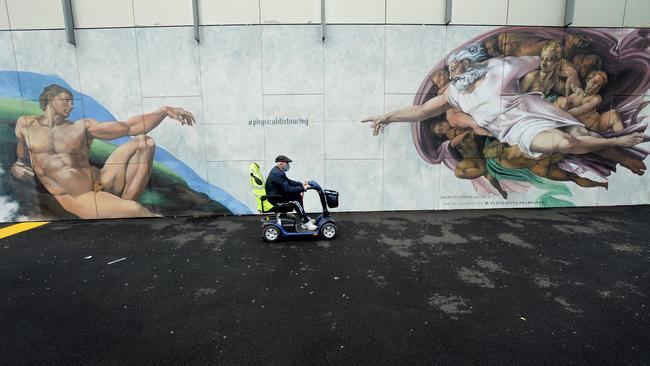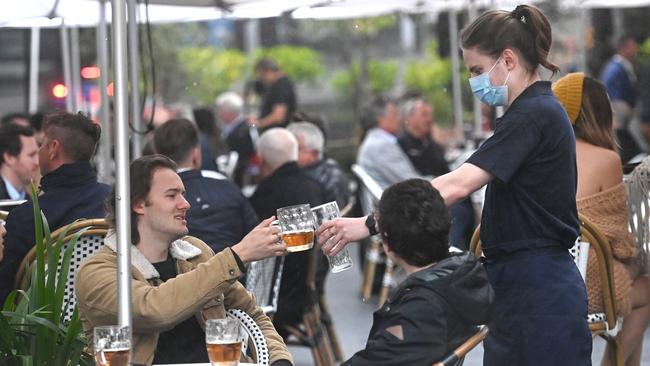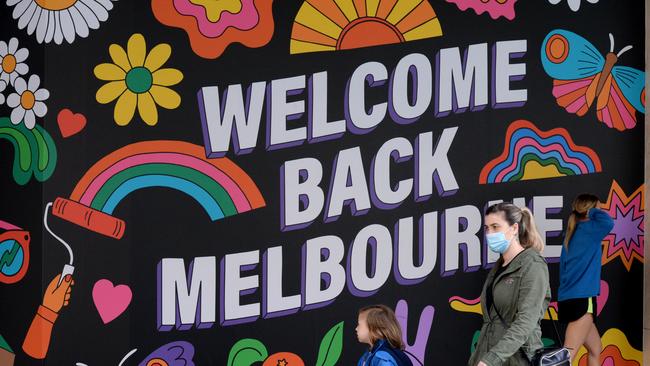Covid, federalism and our creative crisis
The pandemic has highlighted what works, and what could work better, in society.

On the Covid road, there have been abrupt and uncertain turns. Australia has just taken one of the sharpest. It has involved NSW and Victoria charting paths out of the most severe lockdowns to date, paths that are risky given the virulence of the Delta strain. The moment is timely to reflect on how well and how badly the different polities around the country have performed since the start of 2020.
To me, the most striking fact is the vindication of the federalist structure of separate state jurisdictions (and territories) vis a vis the commonwealth. Never in the nation’s history has this diffusion of governance proved so important. We can now judge how fortunate it was that the numerous federal politicians, including Bob Hawke, who, over the years argued for the abolition of state governments, didn’t get their way. Mind, the abolition would never have happened, given the resistance of the electorate to even minor constitutional change.
The first benefit has been in much more agile and efficient decentralised responses to the fast-moving pandemic – the same has been true in the US, although with more mixed success. States without infection have been able to close borders and keep normal social and economic life going. Within states, regions with low infection have been exempted from severe restrictions. Within cities, it has been possible to isolate hotspots. Premiers became the most important leaders in the country, with their daily press conferences, especially in Melbourne and Sydney, monopolising public attention. Their announcements and their decisions have governed life in these abnormal times.
The second benefit of federalism has been that differences of opinion among the premiers have helped the public debate about alternative strategies in defending against Covid. The soft touch of the ex-NSW premier, and her reluctance to lock her state down, has contrasted with the tougher, go-hard, go-early reflexes of the Victorian Premier. A conjunction of circumstances and lessons learnt from NSW forced Daniel Andrews to change tactics, which he wisely did, leading to the two largest states having very similar projected paths out of the current lockdown.
The virus has proved fiendishly difficult to contain, a bit like hanging onto the proverbial tiger by the tail. Delta infections have been sprouting out of seeming nowhere, then wildly proliferating, zero cases one day, a day later 50, then several hundred, on to a thousand.
Lockdowns hardly serve to contain any more. Medical research institutes churn out forecasting models that predict infection paths, giving the state governments something to pin their road maps to, but the truth is that trial and error reigns, and flying by the seat of the pants remains the default method in combating the pandemic. Surges of public optimism as states emerge from lockdown may prove cruelly brief.

Some commentators have lamented the wilfulness of premiers going their own way, threatening the homogeneity of the nation, on the basis of who do they think they are. Critics seem to fear that these trumped-up, tin-pot dictators, as they mock them, will lead the country into anarchy and dissolution. This fear seems groundless. Australians are fiercely nationalistic and patriotic, an attachment that is not going to change. The moment of state primacy will pass. And if there is any failing on this front, it is that of a non-elected quasi-legal body in Sydney pressuring a competent premier to resign on relatively trivial grounds.
Federalism as a constitutional system is mirrored in passionate local allegiances – as Queenslanders, Tasmanians, West Australians, and the rest. As a general sociological rule, the broader and deeper the tissues of belonging, the healthier the society. So, we in Australia are better off living in a society of pluralistic multiple attachments, to all of nation, state, and even town and suburb. The opposite may be observed in dictatorships, in which the political imperative is to eliminate all intermediate groups and associations between power concentrated at the top and the helpless mass of individuals at the bottom – China is currently a case in point.
With premiers making most of the big decisions, the fundamental question arises, diametrically at odds with the views of those who have wanted to abolish the states: What is the point of the federal government? To pose the challenge pertinent to the current moment: does the federal health department have any reason for existing, if it fails in its one task, to protect the health of the nation. Its performance has been poor. It has displayed lack of both judgment and urgency in relation to its one pandemic priority – vaccine purchase and distribution. It contributed to vaccine hesitancy via its medical advisory body, ATAGI, limiting its AstraZeneca recommendation to those over 60 – the vaccine in plentiful supply here, because of local manufacture. Further, loudly publicising the vaccine’s side-effects in a minuscule number of cases was to prove bewilderingly foolish. The Prime Minister and his Health Minister, in turn, were unwise to accept this advice.
The department then failed to counter with an effective marketing campaign, which should have been blindingly simple: showing the severity of Covid for patients in intensive care, versus the brilliant efficacy of the vaccines, including AZ, in combating the disease if caught, and reducing its spread. It is still the case that masses of people are scared of the vaccines.
The most serious government failing during the pandemic has been the slow pace of vaccination – Australia moving gradually up from near the bottom of the developed world’s OECD countries. Senior health officials, led by the Prime Minister, proved unhelpful when they proclaimed that vaccination was not a race. And, in the current rush to get vaccinated, NSW is performing much better than Victoria, which has something to do with Andrews’ less-effective marketing strategy and injection-site mobilisation. Most of all, lockdown fatigue in Victoria may have morphed into blanket public lethargy, and crankiness, reflected in continuing high infection numbers.

Back to federalism. The importance of the central government has been displayed on other fronts. Providing billions to fund income and business support through lockdowns might be cited. But this could alternatively have been organised at the state level.
It has rather been in the traditional preserves of foreign relations and defence that Canberra has displayed its singular role. The rising threat from belligerent totalitarian China has prompted an urgent shake-up that resulted in the recent creation of AUKUS, a deal with the US and Britain to collaborate in the building of nuclear-powered submarines, including the sharing of highly classified technology. This is a move of major geopolitical significance, with the Morrison government substantively strengthening the alliance with the US at a critical time, recalibrating the nation’s external relations, and consolidating American commitment to the Pacific region. This diplomatic and defence triumph may well prove the Prime Minister’s greatest achievement.
If we consider governance in the broader sense of the society’s adaptability, the ways its collective conscience has stayed whole or alternatively fractured, other positives and negatives become apparent. For example, on the positive side of the ledger there has been some impressive institutional performance. The Australian Football League managed to keep its whole season of fixtures going, adroitly shifting matches often at short notice to negotiate border closures and quarantine strictures, creating bubbles for players away from their home city, and even managing to stage sellout finals. The AFL thereby massively contributed to the social good in bleak times, providing interest and excitement for the millions who follow the code.
The high quality of Australian medicine and overall health provision should be acknowledged. To enter one of the large public hospitals at present is to be impressed by a complex military-like drill of testing, protective gear, and processing involving a myriad staff from administrators, cleaners, and nurses to registrars and surgeons, with ambulances delivering to emergency, and then sometimes intensive care, the overall picture one of a hubbub of high competency. Specialist bodies of world eminence like the Doherty and Burnet institutes are providing a vital advisory role in fighting the virus. And the existence of CSL, with large manufacturing capacity to produce vaccines like AZ, has helped protect the nation.
Victoria, after its long second lockdown last year, bounced back with extraordinary economic vigour. It was like a stallion cooped up in stables all winter that had suddenly been released into sunny, verdant pasture, and galloped free. Here was reflection of underlying optimism and confidence, indicative of healthy social spirits. Early evidence from Sydney suggests the same will happen this time in the two largest states.
On the negative side of the ledger, there has been an odd assembly of groups believing they are above the law. The problem has had a multicultural component. Australia has benefited prodigiously since 1945 from its rightly vaunted multiculturalism, and its success at integrating groups from hundreds of cultures into a cohesive whole. It has benefited in social dynamism, entrepreneurial vibrancy and flair, and a rich melting-pot diversity of customs, food, and cultural inventiveness. But there has been a cost. In the two heavily multicultural cities, Sydney and Melbourne, infection spread disproportionately in areas with concentrated multiethnic populations and played the major role in both cities losing control of the Delta variant of Covid. Many factors combined: lower socio-economic status; larger extended families used to gathering frequently together at close quarters; language interpretation and communication problems making access to government edicts and rules, and understanding them, more difficult, and perhaps making some of these groups, anxiously turned in on themselves, more susceptible to anti-vaxxer scare messaging; and greater financial dependency on family members travelling to work, not taking days off sick, and delaying getting Covid tests.

For comic relief, there have been episodes like ultra-orthodox Jews clad in heavy black garb crawling over Melbourne roofs at night to escape police detection after an illegal religious gathering. The more serious point is the continuing existence of residual attachment to ethnic and religious authority, and kinship ties, believing they overrule the law of the land. On display here has been a type of social introversion in retreat from the public sphere, damaging to the common weal in a time of emergency.
More recently, at the upper end of the socio-economic spectrum, gaggles of professionals, including barristers and doctors, have gathered socially without a sideways glance at the laws they are breaking. And illegal AFL Grand Final parties across Melbourne led to a massive surge in infections. The current Victorian lockdown is looking more and more like an overused old bag giving way at the seams, with the state government at risk of not only losing control, which it has, but becoming demoralised. It can’t but be affected by the sobering fact Melbourne has the world record for the city having spent the longest time in lockdowns, a fact that speaks of some profound failure of governance.
Of further damage to the social fabric have been assorted maverick rebels, like the principal of the Fitzroy Community School, who encouraged parents in June to break the law and send their children to school, leading to a major Covid outbreak. And Melbourne construction workers who, after decades of their unions encouraging militant thuggery, turned on their own union, in an act outsiders might have enjoyed as poetic justice, with CFMEU headquarters being subject to violent attack by members, and like-minded tradies. Other anti-vaxxer enclaves include fundamentalist Christians, Byron Bay-type hippy libertarians, and a motley ugly subclass of disaffected anti-government anarchists and social misfits, spouting a mix of extreme left and extreme right doctrine.
Finally, as we travel further along the seemingly interminable Covid road, there is an age-old lesson for government: don’t waste a crisis. Wars, depressions, and pandemics are so disruptive of the political firmament that governments can make major reforms that would be impossible in normal circumstances. The recent bipartisan acceptance of Australia going nuclear in relation to powering submarines provides an example, if a modest one. The Labor Party would have likely resisted in less troubled times. The federal government might contemplate an overhaul of taxation, work practice and small business law in order to help the nation become more adaptable to the unforeseen challenges that it will face in a post-pandemic world.
John Carroll is professor emeritus of sociology at La Trobe University.






To join the conversation, please log in. Don't have an account? Register
Join the conversation, you are commenting as Logout